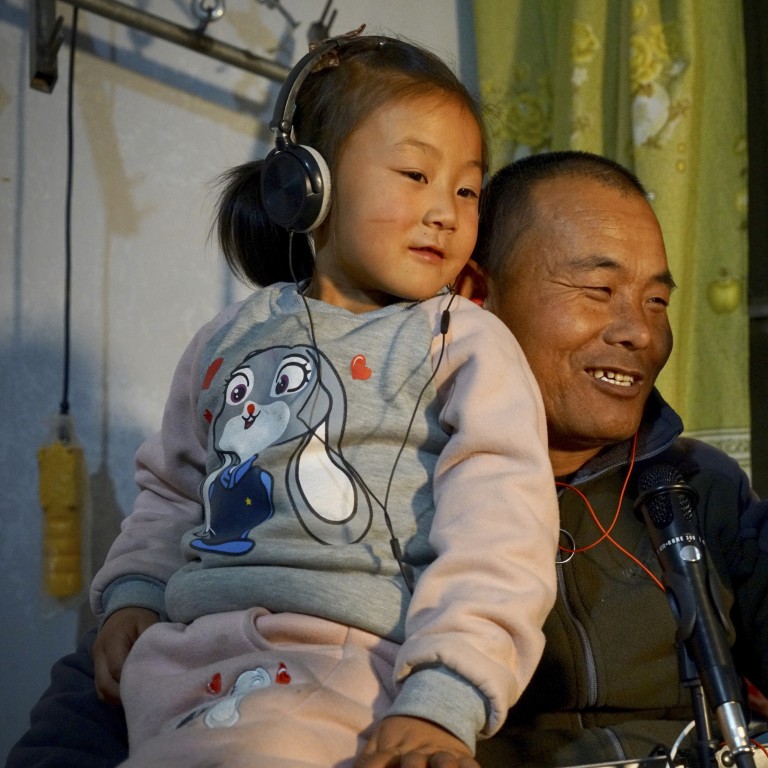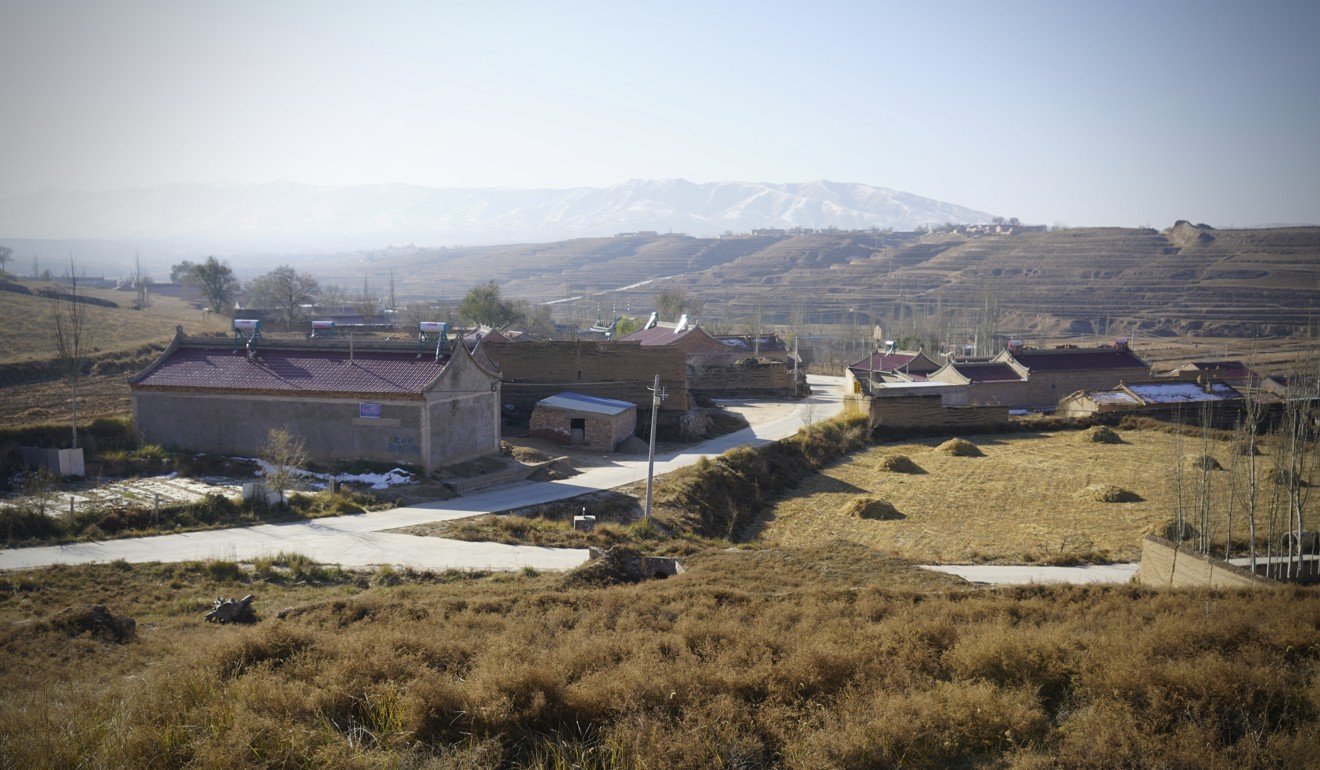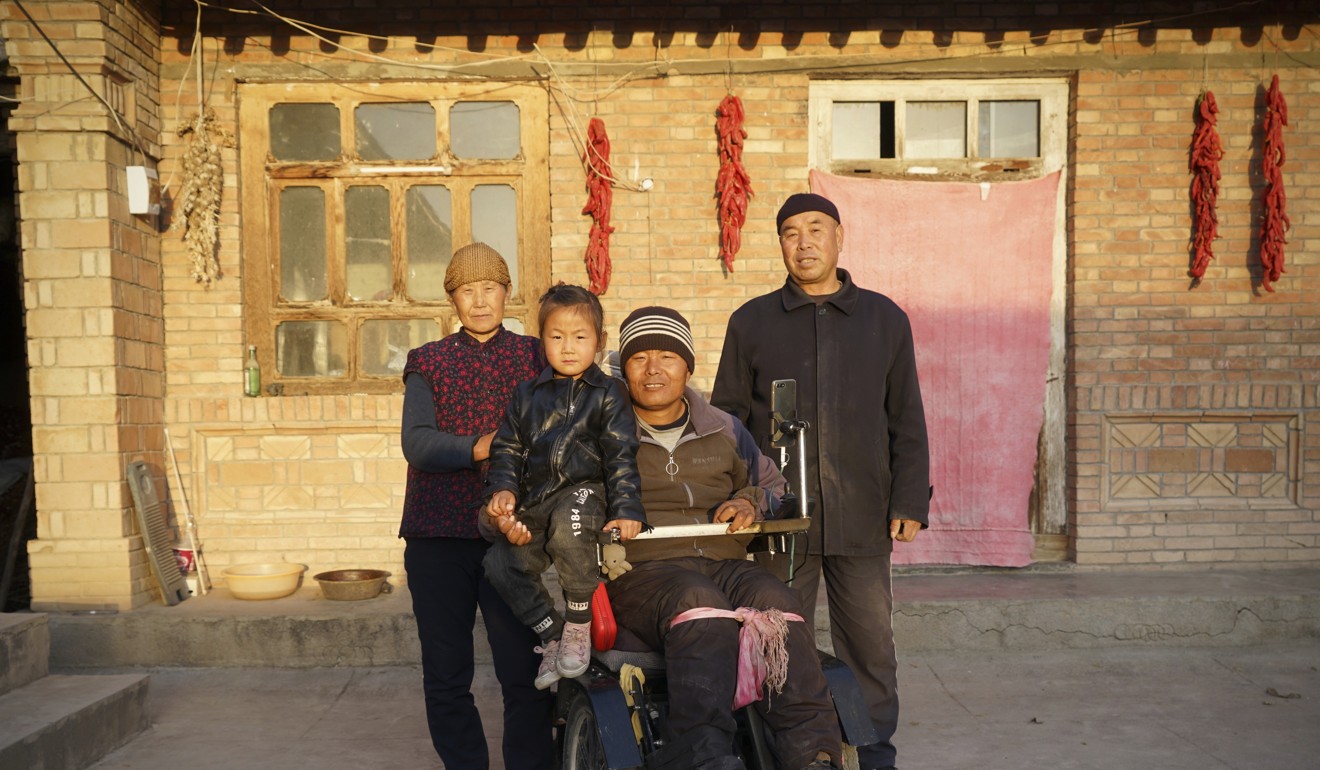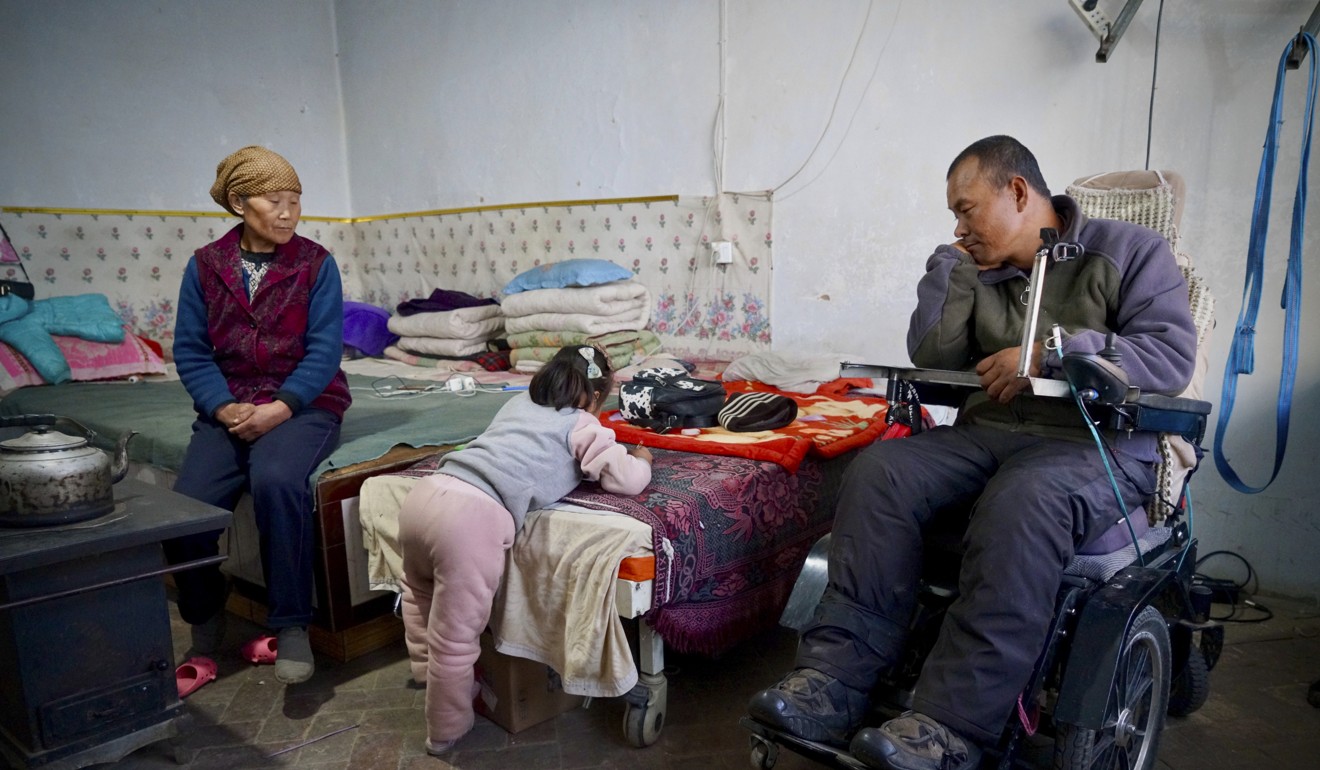
Live from rural China: how a paralysed man found new life as an internet star
- Tian Haicheng took up live-streaming to distract himself from the effects of a devastating car crash
- His shows have become a moneymaker, easing the strain on his family
By day, Tian Haicheng relies on others to help him dress, eat and bathe.
But when night falls, the paralysed former factory worker in northwest China transforms into a live-streaming star.
As soon as he logs on to an online chat room from his home in the Ningxia Hui autonomous region, he is greeted by many of his more than half a million faithful viewers.
“What took you so long?” one writes.
Using the knuckles of his permanently fisted hand, Tian, 39, navigates the mobile phone he uses to stream his cheery updates, turns on the microphone and starts talking.
He greets the viewers, makes jokes about himself, and sings with his six-year-old daughter Jiajia.
Virtual hearts and flowers flood the screen, digital gifts that can be turned into real money. In a good month Tian can earn about 3,000 yuan (US$447) from these performances.
It’s a livelihood that up until a couple of years ago Tian had no idea even existed.
Back then, Tian was in the depths of despair, permanently crippled and dependent on the eldest and youngest members of his household.
The once proud breadwinner and factory worker was struggling to find a reason to live after a devastating car crash. His journey back is a tale of not only his but a whole family’s journey through adversity.
Everything changed for Tian just after Lunar New Year in 2016. His friend was driving him into town to get paid for a welding job when the speeding vehicle flipped over on a corner and landed in a ditch. His head smashed against some concrete and he passed out.
The driver, who was neither licensed nor insured, walked away uninjured but Tian was left with permanent severe spinal damage.
During his first few days in hospital, he could barely move a muscle. He lay all day in bed, waiting for his mother to dress him, feed him and wash him.
The man who could once hoist a 100kg bag of grain onto his shoulder with one hand could now not even lift a chopstick.
The family barely scraped together enough money to pay for a few days of treatment in intensive care but did not have enough for surgery, sending Tian home to the care of his wife and their two children, Jiajia and her then 10-year-old brother.
Chinese girl, 6, helps make ends meet with videos of her taking care of paralysed dad
But two months later, Tian’s wife left to go to another town for a few days, taking their son with her. She never returned. He called her several times to ask why, but she never gave a clear answer, he said.
Tian’s elderly parents briefly considered admitting him to a convalescent home, but the cost of care was way beyond anything they could afford and the parents had no option but to look after him themselves.
“The doctor at the home said instead of ending in disappointment, I should just try exercises at home, I can recover to whatever level possible,” he said.
Starting over
Tian Junlin, Tian Haicheng’s father, is a stout, quiet man who cannot sit still. From dawn till dusk, he feeds the cows, chops wood and works in the fields, planting corn in Haiyuan, one of Ningxia’s driest areas.

Just before Lunar New Year, the corn harvest is in and the land is bare and hard with frost. Corn stalks that have not been picked clean poke through the ground like hundreds of spikes.
In the 1970s, the United Nations described the county as the “most unfit place for human settlement” and today nearly 45,000 people in the area live below the poverty line.
Its dusty, yellow land is so parched that irrigation systems cannot even be installed, according to Tian Junlin.
He earns about 6,000 yuan (US$895) a year from farming – roughly a quarter of the national average wage. But as tough as things are, Tian Junlin has known worse.
In the great famine of 1959, villagers stripped the land, ingesting everything in a desperate effort to fill their stomachs. There were no crops, no grass, not even a single piece of bark left on the trees.
It was the worst period of his life, but he survived it as a boy. Afterwards, life grew better and richer. Someone in the village started doing business and bought a car, and so did he. He had a family, two sons and then grandchildren came along.
Just as he was about to settle into peaceful old age, his eldest son was hit by a car.
“When people my age are being cared for by their children, I have to do the opposite,” he said.
“But what is there to do? This is fate.”
Chinese-African couple become live-streaming hit in China
Tian Junlin and his wife, Ma Yingxiu, took on the huge task of caring for their son around the clock. At the same time, Tian Haicheng despaired about his future and grew suicidal.
In the summer, when flies and mosquitoes descended, the best he could do was wrinkle his nose and hope they would leave him alone.
Laid out on his bed, he would pass time by counting and recounting the thousands of stripes painted on the ceiling.
“When others can’t sleep, they count sheep. But me? I count stripes,” he said.
He also replayed his happiest memories over and over in his head. One of them was of getting off work from his factory job to find his wife standing outside, waving at him.
It was a memory of a lost time.
A way ahead
One day, Tian’s mother pushed his bed outside so he could get some sunlight while she went to work in the fields with his father. As Tian lay on the bed, close to the front door, he saw a bottle of pesticide hanging on the wall. He called over Jiajia, then four, telling her he had a cold.
Jiajia raised a hand to Tian’s forehead to test his temperature, then she nodded and said: “You’re indeed sick.”
“Then get that bottle from the wall,” Tian recalled telling her. “It’s daddy’s medicine.”
But Jiajia was suspicious.
“That’s a drug for the bugs,” she said, running out to alert her grandfather.
Tian’s parents berated him and kept a close eye on him afterwards but the invalid was not deterred.
A few months later, when he was playing with his daughter, he told her to pull the back of his chair as far back as she could. He wanted to see whether a fall could kill him.
What Tian did not expect, however, was that the chair suddenly collapsed on top of Jiajia, badly skinning her knees.
Tian blamed himself for putting his daughter through pain and gave up his suicide plans. From then on, he decided, he would live.

Living meant coming to terms with his paralysis. While Tian now has partial movement in his arms and chest, he is paralysed from the waist down. His fingers are in a permanent claw but he operates an electric wheelchair with the palm of his hand and uses his knuckles to operate his cellphone.
“They are as good as dog’s paws,” he said.
To his surprise, his daughter Jiajia started copying how her grandparents took care of her father. She proved such a quick study that she was just four years old when she started feeding him.
She used to help with the morning routine, moving him to the chair, then helping him brush his teeth and wash.
From League of Legends host to Chinese live-streaming celebrity: how ‘Brother Chopstick’ triumphed over adversity
Sometimes, she sets a bowl of noodles in front of him. She then straps a spoon to his hand with a rubber band to make it easier for him to grasp the utensil, and holds the bowl while he eats.
To take his mind off his disability, Tian also signed up on a popular video-sharing and live-streaming service called Kuaishou. A friend had told him that some people earned money by talking to others on it.
At first, Tian only wanted to distract himself but gradually, as he gained an audience, he found he could pay his medical bills by cashing in the digital gifts his viewers sent him.
He broadcasts every detail of his life: from Jiajia helping him dress and feeding him to him going to pick her up from school on his electric wheelchair.
With more than 800 videos in the bank and more than 580,000 fans online, Tian has created a strong connection to the outside world.

When he turns off the screen though, he still sometimes feels confused and hopeless about the future. He doesn’t know what will become of him, and sometimes he has to work hard to be optimistic, believing there might be a cure for paralysis in the future.
“I heard there are new experiments being done from TV,” he said. “They talk about a ‘head transplant’.”
But the new year has brought some good news at least – Tian’s wife has returned. She’s seen in the most recent videos helping her husband to dress and strapping him to a chair, with their two children by their side. “I’m happy again now that my family is complete,” he says to the camera.

.jpg?itok=H5_PTCSf&v=1700020945)